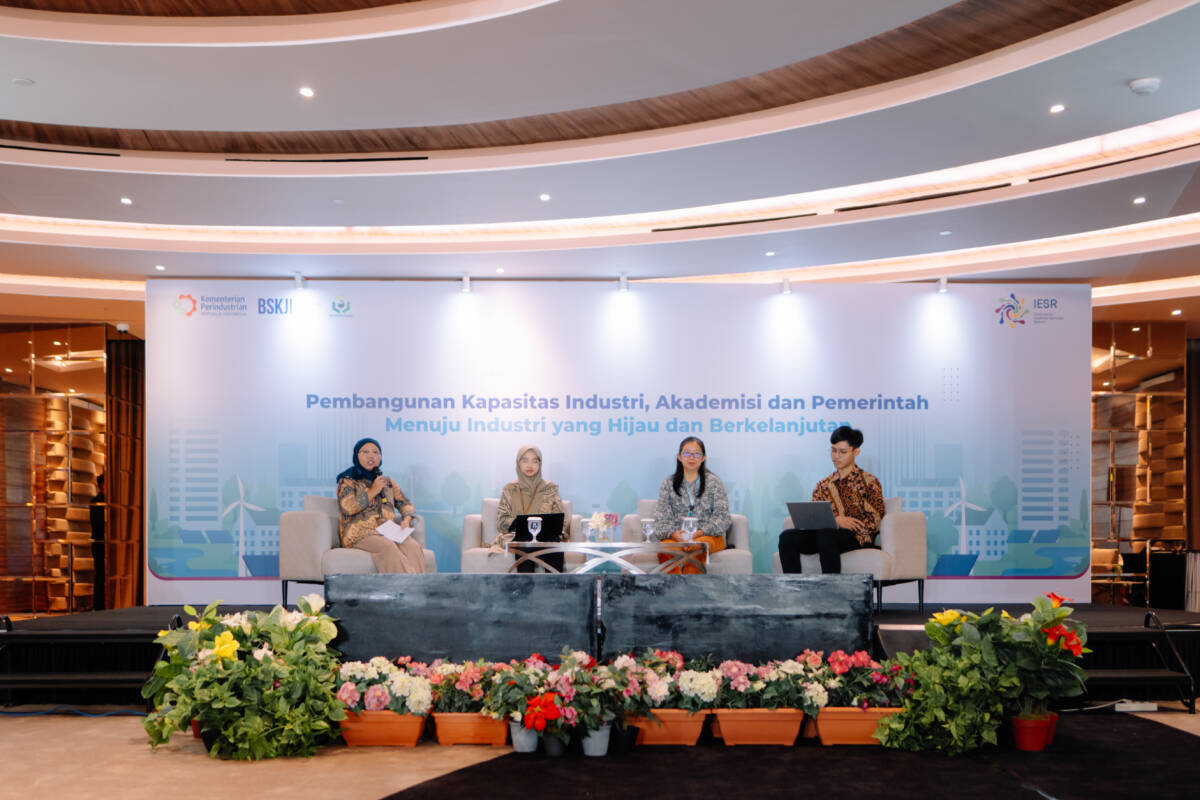Jakarta, 20 June 2024 – Indonesia’s economic growth is supported by several sectors, one of which is industry. In the non-oil and gas processing industry, there is an increase in contribution to Indonesia’s GDP, from 16% in quarter 1 of 2023 to 17% in quarter 2024. This significant economic contribution also has another side impact, namely the increase in greenhouse gas (GHG) emissions in the industrial sector. which is also getting higher. In a workshop on Capacity Building for Industry, Academics, Government Towards a Green and Sustainable Industry organized by the Institute for Essential Services Reform (IESR) and the Ministry of Industry, Apit Pria Nugraha, Head of the Green Industry Center explained that the Indonesian Government is aware of the current world situation to suppress GHG emissions.
“The Indonesian government’s current focus is on meeting the emission reduction targets in the enhanced NDC document. (Burden) to reduce emission is not the responsibility of just one party. It is important for industry, academia and government to understand the importance of carbon reduction,” he said.
Apit added, on the industrial side, one of the efforts to reduce industry is by implementing the economic value of carbon (carbon price). To support this, his party has prepared a number of regulations, namely: (1) carbon trading roadmap for industry, (2) Industrial Ministry Decree regarding carbon trading in the industrial sector, (3) upper limit on carbon trading, (4) carbon trading procedures, and (5) carbon trading integrated information system.
It is urgent to reduce emissions in general. Deon Arinaldo, Energy Transformation Program Manager of the Institute for Essential Services Reform (IESR) said that currently the earth has experienced a temperature increase of 1.36 degrees Celsius since pre-industrial times, the time and tolerance limits for increasing the earth’s temperature are getting narrower.
“This increase in temperature is already being felt in our current conditions, such as hot weather and extreme weather, and so on. “This needs to be a concern when we pass a temperature increase of 1.5 – 2 degrees Celsius, it can have implications for the economy, such as certainty in the supply chain of raw materials and increased costs of industrial manufacturing and trade,” said Deon.
Priyanto Rohmattullah, Director of Environment, Bappenas, expressed the close connection between sustainable development and reducing economic risks due to the climate crisis. He explained that Bappenas launched an initiative to build climate resilience which was strengthened by presidential instructions (Low Carbon Development Indonesia-LCDI). The results of this study show that by implementing low carbon development Indonesia can reduce losses of up to 300 trillion rupiah.
“To carry out the implementation of this study, strong and consistent political will is needed,” said Priyanto.
Industry can also reap benefits from decarbonization of the industrial sector, including operational cost savings from implementing energy efficiency. Dhifan Nabighdazweda, IESR Energy Analyst, explained that energy efficiency and fuel efficiency are the first pillars of industrial decarbonization and currently not much has been done even though they have the potential to reduce production costs by up to 10-20 percent.
“The government has committed to reducing emissions, but this commitment needs to be increased. There is no silver bullet solution that can be used by all industrial sectors. “We need special studies on each type of industry by considering industry characteristics,” said Dhifan.
Sri Gadis Pari Bekti, industrial supervisor, Center for Green Industry, Ministry of Industry explained one of the industrial decarbonization strategies, namely by building green industry in Indonesia.
“We see several urgency in implementing green industry, including the vulnerability of raw material and energy supplies, contributions to the Paris Agreement commitments and the expansion of carbon markets and capital markets to adopt sustainable aspects,” he said.
Schneider International also recognizes the urgency of transforming industry towards a green industry. Devina Raditya Environmental and Sustainability Director, Schneider Electric Global Supply Chain explained that the need to reduce carbon dioxide emissions demands immediate concrete action and requires the cooperation of many parties.
“If we don’t work together to eradicate and reduce it, we will be very slow in overcoming the carbon problem,” said Devina.
Globally, a number of business and industrial entities have gathered themselves into the RE100 group to accelerate policy change for more renewable energy in the grid. This group continues to push for decarbonization while also urging the government to create a policy framework that further supports the growth of sustainable ecosystems such as renewable energy.
Laura Thomas, Senior Policy Officer of RE100, explained the current conditions in Indonesia. The majority of RE100 members in Indonesia purchase renewable energy through the Renewable Energy Certificate (REC) mechanism.
“There must be improvements to the renewable energy procurement mechanism on the grid. This improvement is not only for increasing capacity but will also attract investors to participate in financing renewable energy projects,” explained Laura.

